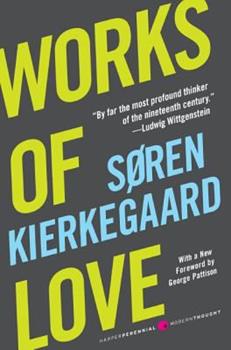For this Tuesday, please read Soren Kierkegaard’s Works of Love excerpt 27 The Greater Love and excerpt 28 Love the Person You See as found in Provocations. Last week we discussed generally God’s love for us and our love for our neighbor. This week’s discussion will focus on how God’s love for us shows us how to put our love of neighbor into practice.
In The Greater Love, Kierkegaard begins with the observation that all love is really a relationship between three people – Lover-God-Beloved. Kierkegaard’s observation builds upon his teaching in the prior excerpt on Neighbor Love that we discussed last week. In last week’s reading, Kierkegaard says that Christian love (unconditional, impartial, and duty-bound) is not only superior to preferential love but should form the foundation of all preferential love. As he says, “Love your beloved faithfully and tenderly, but let love to your neighbor be the sanctifier in your covenant of union.” (p.97) In other words, the love of your spouse, your child, or your friend should first begin with unconditional neighborly love and only then become a preferential love.
Kierkegaard’s teaching is based primarily on 1 John 4:7-12 – God is love. Therefore, any relationship that is based on Love is necessarily based on God. Conversely, a relationship not based on God is not based in Love but on something else. These other things, like feelings, passions, or human judgment, can and will change and are not subject to the shall that Love requires. To paraphrase Jesus (Matt. 7:24-27), a relationship can either be built on the rock of God’s love or the shifting sands of human preference.
Within our marriage rite, we see this three-way love. The rite begins with the Declaration of Consent where the celebrant asks “Will you love him, comfort him, honor and keep him, in sickness and in health, and forsaking all others, be faithful to him as long as you both shall live?” (1979 BCP 424). This Declaration is not asked from one party to the other, rather the Declaration is asked by the celebrant and in the presence of God. The consent is an “I will” to God, not the other person. The Declaration precedes the vows, so that when the vows are exchanged, the foundation of the marriage in a promise to God is already present.
Dinner is at 6. The menu is roast pork. Discussion about 6:45. Hope to see you here.
Unless the Lord builds the house,
Psalm 127:1-2
their labor is in vain who build it.
Unless the Lord watches over the city,
in vain the watchman keep vigil.

